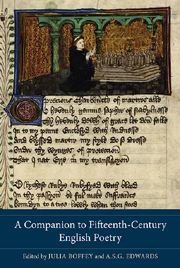Book contents
- Frontmatter
- Contents
- List of Contributors
- List of Abbreviations
- Conventions
- Introduction
- Part I Background and Context
- Part II Authors
- 3 Thomas Hoccleve
- 4 Thomas Hoccleve's Regiment of Princes
- 5 John Lydgate's Major Poems
- 6 John Lydgate's Religious Poetry
- 7 John Lydgate's Shorter Secular Poems
- 8 John Capgrave and Osbern Bokenham: Verse Saints' Lives
- 9 Peter Idley and George Ashby
- 10 John Audelay and James Ryman
- Part III Themes and Genres
- Chronology
- Index of Manuscripts
- General Index
7 - John Lydgate's Shorter Secular Poems
from Part II - Authors
Published online by Cambridge University Press: 05 July 2013
- Frontmatter
- Contents
- List of Contributors
- List of Abbreviations
- Conventions
- Introduction
- Part I Background and Context
- Part II Authors
- 3 Thomas Hoccleve
- 4 Thomas Hoccleve's Regiment of Princes
- 5 John Lydgate's Major Poems
- 6 John Lydgate's Religious Poetry
- 7 John Lydgate's Shorter Secular Poems
- 8 John Capgrave and Osbern Bokenham: Verse Saints' Lives
- 9 Peter Idley and George Ashby
- 10 John Audelay and James Ryman
- Part III Themes and Genres
- Chronology
- Index of Manuscripts
- General Index
Summary
The number of short secular poems associated reliably with John Lydgate (c.1370–1449) is considerable. However, despite the variety of Lydgate's shorter verse in style, subject matter and genre, its critical reception has been mixed and his shorter poems are often neglected in favour of his more ambitious works such as Siege of Thebes, Troy Book and Fall of Princes. The only critical edition of Lydgate's collected ‘minor’ poems, secular and religious, is that by Henry Noble MacCracken, made for the Early English Text Society in the early decades of the twentieth century (Lydgate, ed. MacCracken 1934; see also Lydgate, ed. Norton Smith 1966; Lydgate, ed. Sponsler 2010). The poems are not always accurately transcribed, there is no commentary, and MacCracken was unaware of some witnesses. Critical analysis of these poems has been intermittent apart from Pearsall (1970).
This critical and editorial neglect is surprising above all because Lydgate was immensely popular as a writer of short secular, as well as religious, verse during his lifetime and well into the sixteenth century. He seems to have had an eye for a bestseller in short-poem terms: he composed in all the popular forms of the time, including lyric complaint, parental advice literature, beast fable, historical narrative, debate, and estates and anti-feminist satire, and also wrote ‘mummings’ or ‘disguisings’ – important early dramatic texts usually intended for household performance (Dillon 2006: 39) – and poetic accounts of public celebrations.
- Type
- Chapter
- Information
- A Companion to Fifteenth-Century English Poetry , pp. 87 - 98Publisher: Boydell & BrewerPrint publication year: 2013



